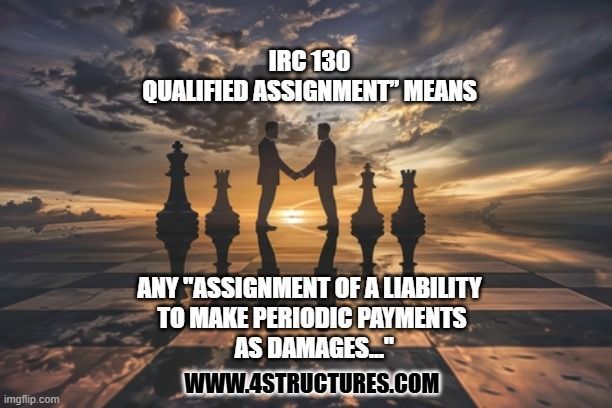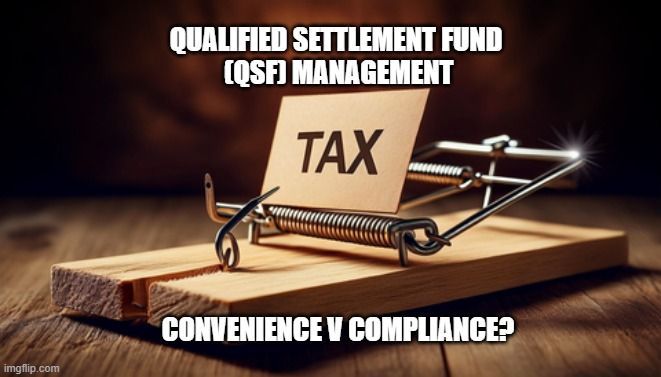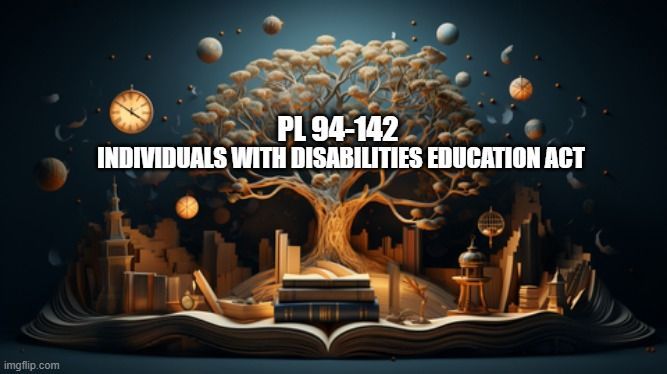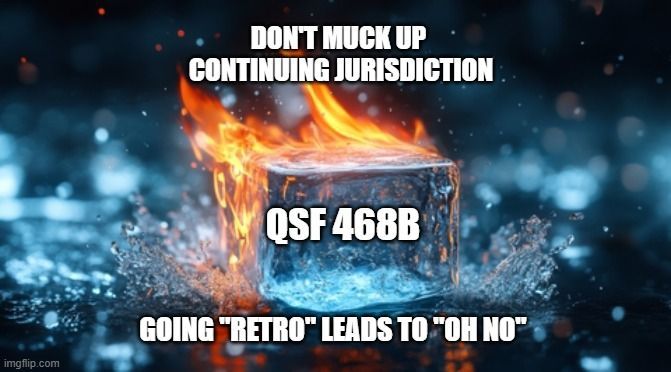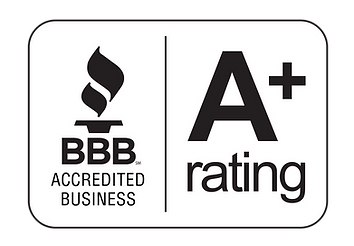Investing in Structured Settlement Receivables | Guide for Unwary Investors
Important Caveats for Investors in Structured Settlement Payments
Investors seeking stable income may be solicited by and/or heard a sales pitch from investment advisers to invest in structured settlements, or invest in a structured settlement annuities. But all is not what it seems.
The structured settlement investment in such cases is not an annuity. It is a receivable, and may neither be appropriate nor suitable for vulnerable retirees and personal injury victims.
Here are some things to consider:
When it Comes to The Term "Structured Settlement"...
1. Acquiring other people's Structured Settlement Payment Rights in a Structured Settlement Factoring Transaction, or in a Subsequent Assignment, is not a Structured Settlement
Note that the structured settlement definition at IRC Section 5891(c)(1), which became effective January 2002, is preceded by the words "for the purposes of this section" (expressly to do with the imposition of an excise tax on structured settlement factoring transactions). Despite this limitation the use of the definition is often expanded by settlement planners, structured settlement brokers, settlement purchasers and industry commentators. Structured settlements had been in existence for over 20 years prior to the enactment of the Victims of Terrorism Tax Relief Act of 2001 (VTTRA), which created IRC Section 5891, ostensibly an attempt to curb structured settlement factoring company abusive business practice. The VTTRA also provides a regulatory framework for exceptions to the excise tax that would be levied pursuant to the act of Congress and collected by the IRS, in the event a structured settlement factoring transaction does not comply with the applicable state structured settlement protection statute.
2. Investors Should Be Wary of Inaccuracies Used by Promoters of Structured Settlement Receivables Investments
Certain promoters and intermediaries of structured settlement investments, either intentionally or out of ignorance, mislead investors by falsely claiming that structured settlement receivables (factored structured settlement payment streams) are annuities.
On my Structured Settlement Watchdog blog in June 2025, I've shed light on a Florida promoter of structured settlement receivables who incorporates and trades on the term "annuities" and the trademarked logos of life companies to do so on a rotating wheel that displays to the website's visitors.
The promoter's activities don't jive with the definition of annuity under the insurance laws of most states and the statutory accounting pronouncements of the National Association of Insurance Commissioners as well as actions taken to exclude such investments by Life & Health Guaranty Associations in 80% of U.S. states to date that have adopted the 2017 Revisons to the Life & Health Guaranty Associations Model Act; and a review of some of the cases that have been litigated, or in ongoing litigation.
When I checked the Florida Department of Financial Services website at the begining of June 2025, I learned that the promoter was not appointed with the structured settlement annuity issuers whose logos his company is trading on to promote structured settlement receivables.
The perpetrators of the receivables=annuity lie may even include certain settlement planners.
On February 25, 2019, a presentation at the annual meeting of the Society of Settlement Planners there was a presentation ominously titled "Dealing With a Secondary Annuity Purchase That Has Gone South". Lawyers who work with settlement planners promoting false claims about these investments to personal injury attorneys or their vulnerable or impaired clients should look beyond the potentially misleading allure of money such individuals contribute to state or national trial lawyer associations.
In its Statutory Issue Paper 160, initially released in December 2018 and finalized April 6, 2019, the National Association of Insurance Commissioners opined that acquired structured settlement payments rights (factored structured settlement payment streams) are neither annuities, nor insurance products. [ see NAIC Statutory Issue Paper No. 160 p6 Section 6 Footnote 1 ]
A "secondary market annuity" is not an annuity, period.
That has not stopped players in the secondary market from falsely calling them annuities. One California settlement planner, who held and still holds an active California insurance license, even made a declaration under penalty of perjury to a California Court in July 2012 as part of an elaborate effort to convince a California Superior Court judge to approve such investments to feed into a Special Needs Trust for a disabled plaintiff, who was a Minor, using a Qualified Settlement Fund to purchase them.
CA Ins Code § 10509.913 (2020) (a) “Annuity” means an annuity that is an insurance product under California law that is individually solicited, regardless of whether or not the product is classified as an individual or group annuity.
The term annuity was repeatedly misused in the California settlement planner's declaration, which seemed intended to mislead the judge by falsely claiming there was "no change in funding asset." Creative? Yes. Truthful? No. The California settlement planner's July 2012 declaration, discovered online in 2021, has been preserved. It raises questions about how often similar declarations were used in the years since, with other judges and clients of plaintiff lawyers. How many transactions involving receivable acquisitions were approved for disabled plaintiffs or minors under the mistaken belief that an annuity was the investment when it wasn't?
You would think that if a structured settlement receivable is an annuity under the California Insurance Code, it would appear in the "Kinds of Annuities" section in the
California Department of Insurance guide
Annuities for Seniors |What You Need to Know
3. Litigation involving structured settlement receivables has resulted in investor funds being jeopardized or entirely lost.
A. Litigation has already concluded in which investors in structured settlement payment rights lost their entire investment , due to a fraud. Robert and Linda Wall invested retirement funds and purchased the structured settlement payment rights on the advice of their Pittsburgh based financial adviser who when deposed stated the Walls " invested in 5 structured settlement annuities". An intermediary Altium Group, LLC who was sued by the Walls, advertised "Invest in secondary market annuities...Up to 8% returns with no volatility and unparalleled safety of principal"
It was a bald faced lie. It was impossible. The Walls were not sold and the Walls did not invest in annuities even though they thought they did. Then disaster struck some time later, when a fraud was discovered in the origination. The Walls sued their financial adviser and the intermediary who did the deal. In the end they lost everything, their investment, the bargained for investment return, the legal fees they had to spend and to add insult to injury they had to pay the legal fees of their adversary under the loser pays clause in their contract. Robert Wall and Linda Wall v Altium Group, LLC. Civil United States District Court Western Pennsylvania Action 16-1044
B. A retiree from Jacksonville Florida had the majority of his thrift savings plan invested in what was labeled a "secondary market annuity". Worlds collided when it was discovered that the acquired payments were originated from victims of Access Funding and the investment payments ended up being suspended pending the outcome of litigation brought by the Maryland Attorney General. The heartbroken retiree filed a FINRA claim against the financial adviser and one of its former employees and was able to get a small settlement after considerable heartache.
C . Astonishingly, an active California settlement planner (who places people into structured settlement annuities) and a British company each invested money in factored structured settlement payment streams that turned out to be originated from a structured settlement of a Pennsylvania minor, who was only 10 years old when somehow a pair of structured settlement factoring companies began to bamboozle a number of Butler and Beaver County judges over 8 years .The investors' money was in serious jeopardy. The litigation was still pending at the time of original publication of this blog in 2021, but the parties subsequently reached a confidential settlement.
ZACHARY BARBER, JEFFREY BARBER, ADMINISTRATOR OF THE ESTATE OF LINDA LEE JENKINS A/K/A/ LINDA LEE BARBER, DECEASED v. BRUCE STANKO, NORTH HILLS PHARMACY SERVICES, LLC; PACERCHECK, INC.; ET AL APPEAL OF: SEMPRA FINANCE, LLC ("SEMPRA") : IN THE SUPERIOR COURT OF PENNSYLVANIA No. 615 WDA 2020 Appeal from the Order Entered June 5, 2020 In the Court of Common Pleas of Allegheny County Orphans' Court at No(s): No. 4037 of 2005 See Quashed Appeal of Pinnacle Capital, LLC, Michael Pickett and Habitus Funding published May 14, 2021 and Quashed Appeal of Sempra Finance , also published May 14, 2021
D. Litigation that commenced in Maricopa County Arizona in April 2020 and endured for more than 5 years, underscores the complexity of issues that can arise with such investments and affect such investors. Investors in assigned structured settlement receivable investments originated by Genex Capital, and/or assigned to them by Genex, found their investments at risk after they attempted to sell and reassign the assigned receivables to other investors some years later. Genex Capital objected on the basis that such assignments allegedly violated the terms of its Receivables Purchase Agreement, repossessed payments and assigned them to new investors for consideration. A number of the original investors sued Genex Capital in an effort to get back their investment.
In its answer to Plaintiffs' First Amended Complaint and Counterclaims in ongoing Arizona litigation cited below, dated June 11, 2021, Genex Capital Corporation admitted, in answering paragraph 31, that "one component of its business involves purchasing from payees future structured settlement payments due under structured settlement annuities and assigning to investors a subset of those rights. .." (emphasis added) ( also multiple other references to "subsets of those rights..." Ibid at 13, 53, 56, 89, 109, 126)
The complexity of the issues was acknowledged by the parties to the below captioned litigation, when they jointly notified the Superior Court of the State of Arizona in Maricopa County on May 28, 2025 "that they have reached a confidential global settlement of all claims, counterclaims, defenses asserted between them in the consolidated action The parties anticipate a stipulation for dismissal with prejudice within ninety (90) days. Given the number of parties and the complexity of legal issues, this time period is necessary to document settlement agreement and related documents and to ensure the performance of certain settlement obligations prior to dismissal".
IN THE SUPERIOR COURT OF THE STATE OF ARIZONA
IN AND FOR THE COUNTY OF MARICOPA
Case No.: CV2020-004958
Consolidated with Case No.: CV2020-013796
CV2022-002266
GENEX CAPITAL CORPORATION, a
Delaware corporation,
Plaintiff,
vs.
SEELEY CAPITAL MANAGEMENT
INC., a Massachusetts corporation, et al.,
Defendants.
Case No.: CV2020-004958
Consolidated with Case No.: CV2020-013796
CV2022-002266
RICHARD L. KEEFER and VICKI L.
KEEFER, husband and wife, et al.,
Plaintiffs,
vs.
GENEX CAPITAL CORPORATION, a
Delaware corporation, et al.,
Defendants.
AND RELATED COUNTERCLAIMS
1 “Investor Plaintiffs” collectively refers to Plaintiffs/Counterdefendants Richard L. Keefer
and Vicki L. Keefer, HunMi Pak, PANABCO, The Estate of E. Dwayne Walls, Barry
Beitman, West Haven Fire Department, Sandi Haskell, and Weili Guo and Qingling Zhang.
2 “NEAA Parties” collectively refers to Seeley Capital Management, Inc., John M. Bulbrook
Insurance Agency Inc., New England Annuity Associates, LLC, Income Stream Funding
Partners, LLC, Christopher Seeley, John Bulbrook and Jane Doe Bulbrook
[the pleadings are a matter of public record and available to the public online]
Important Summary Points of Caution for Investors in Structured Settlement Payment Rights (Structured Settlement Receivables)
- You are not buying an annuity
- When you buy a legitimate annuity you are buying the actual annuity contract, which is an actual insurance product.
- When a structured settlement is established as part of the consideration paid for settlement of all claims against the Defendant(s), a legitimate annuity, that is an insurance product, is purchased to fund the obligation of the Defendant, its insurer, or in the event of a qualified assignment, the qualified assignment company. A premium is paid to the life insurance company that issues the annuity contract.
- An insurance product can only be sold by appropriately licensed and appointed insurance agents and brokers in accordance with the laws of various states. There is no equivalent licensing standard for structured settlement factoring industry or the tertiary market which participates in making such investments available to investors.
- Even if a licensed insurance agent, broker, structured settlement broker or settlement planner, or even your friendly certified financial planner sells you a structured settlement receivable, guess what? It’s still not an annuity!
- When a structured settlement factoring company purchases structured settlement payments in a factoring transaction, they are not acquiring an annuity or an insurance product. Instead, they are purchasing a structured settlement receivable.
- Furthermore, unless the investor is a "direct designated assignee" in the court order approving the structured settlement transfer, the investor is buying a subset of rights to certain payments ( see Genex Capital Ibid at 45 in contrast to Ibid at 13, 53, 56, 89, 102, 126).
- Ownership of the actual annuity that is generating the structured settlement payments is not transferred to the originating structured settlement factoring company.
- Since the originating structured settlement factoring company isn't purchasing an annuity or insurance product, but rather the rights to payments, it makes sense that "a subset of those rights" (as Genex Capital Corporation aptly described what investors are actually acquiring in return for their investment) is neither an annuity nor an insurance product.
- Investors in structured settlement receivables may face significant challenges: (1) the absence of statutory protections in cases of insolvency; (2) exposure to transactional risks that do not arise with legitimate annuities classified as insurance products; and (3) potential payment servicing delays or risks, such as those highlighted in the extensively covered "SuttonPark Nightmare" on our Structured Settlement Watchdog blog.
These risks highlight why investing in structured settlement payment rights from other people's structured settlements ("structured settlement receivables") may not be suitable for many types of investors, such as investments on behalf of minors, disabled individuals, cognitively impaired individuals and retirees.
#structuredsettlementinvestments #factoredstructuredsettlementpaymentstreams #secondarymarketannuity #secondarymarketannuities #receivablespurchaseagreement #structuredsettlementreceivables
Last updated July 1, 2025


